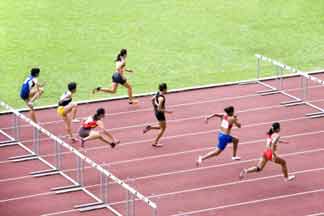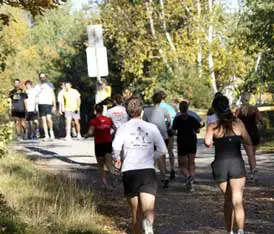After every Olympics, I’m always left with a huge gap in my life that only watching 18 hours of daily television sports can fill.
During past games, I’ve occasionally been able to wrench my bloodshot eyes from the television screen long enough to jot down some observations. Here’s a retrospective.
Race Walking
I’m not a race walking fan. It’s a contrived form of locomotion, in which highly trained athletes are confined by unnatural rules that they all break. For example, “lifting” is illegal – it’s when both feet are off the ground at the same time. Yet, most race walkers do it at some point in the race. Slow motion video of the competitors leaving the Olympic stadium showed a number of them cheating in this manner.
Michael Phelps in School
Michael Phelps, because of his ADHD in school, was once told by a teacher that he’d never be able to focus on anything. Apparently, with Phelps winning eight gold medals in swimming, that teacher was wrong.
Synchronized Swimming
I realize synchronized swimming athletes are highly trained and the sport is difficult, but, it reminds me of cheerleading…in the water…with nothing but upside down legs showing…and with the cheerleaders wearing weird makeup, cheezy smiles and nose clips. I’m afraid I can’t get myself to like it.
The Most Cruel Event
The hurdles must be the most cruel of events. You are never more than 10m from disaster, as Lolo Jones, who had been decisively leading a 100m hurdle final, found out when she clipped the ninth hurdle and dropped from first to seventh in the blink of an eye. Ironically, she probably hit that hurdle because she was running too fast – which is the point in sprint events. That extra speed can change your stride pattern, taking you too close to the upcoming hurdles.
Volleyball Artillery
The Brazilians can serve the volleyball at 118 km/hour. Not spiking, serving! Their serves looked like cannonballs coming across the net.
BMX Biking
BMX biking. Quite a spectacle and very exciting, with lots of crashes and spectacular jumps. But those BMX bikes remind me of the tiny bikes the clowns ride in the circus.
Medal Incentives
One thing I didn’t realize was that the American Olympic medalists receive a financial bonus for winning medals: $25,000 for gold, $15,000 for silver and $10,000 for bronze. Canadians receive $20,000 for gold, $15,000 for silver and $10,000 for bronze. The money is a nice incentive, but it’s tough to live on that for four years.
Grace in Defeat
You can tell more about an athlete’s true character after a crushing defeat than after a win. I was impressed with sprinter Tyson Gay – America’s top hope in the sprints. Gay failed to qualify for a 100m final, then was involved in the botched exchange of the 4 x 100m relay. Although he had pulled a hamstring in the U.S. Olympic trials, he refused to use it as an excuse (although it WAS a factor), and took full responsibility for the botched exchange, although it wasn’t all his fault. Tyson Gay has a new fan and it’s me. I’m also a new fan of U.S. hurdler Lolo Jones, whose following post race interview was an inspiration:
Lolo Jones Interview
I realize it was a controversial decision, but kudos to the International Olympic Committee for awarding the Olympics to China. Yes, China is still a repressive state, and yes they should leave Tibet alone. But China possesses an ancient culture, expanding economy and form of government that are gradually opening themselves to the world. And these Olympics were a wonderful, if small, step in that direction. Getting to know athletes from other cultures on a personal level is one of the true benefits of the Olympics and it’s why boycotts are a bad idea. Don’t YOU feel like you know China a little better after the Games?
Dick Moss, Editor,
PE Update.com
To subscribe to the free PE Tips of the Week Newsletter, Click Here!
To check out the PE Update.com website, Click Here!
[tags]Olympics,Michael Phelps,Lolo Jones,hurdles[/tags]







